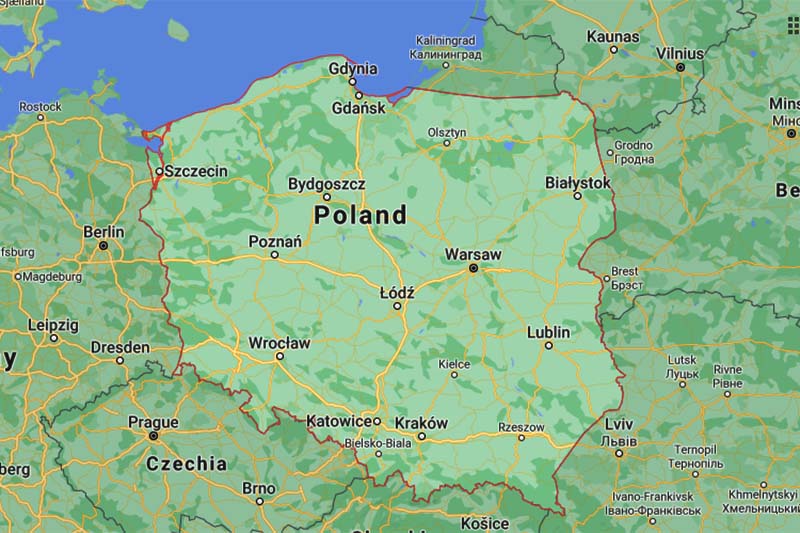

Poland said early Wednesday that a Russian-made missile fell in the country’s east, killing two people, though US President Joe Biden said it was “unlikely” it was fired from Russia.
The blast, which Ukrainian President Volodymr Zelenskyy decried as “a very significant escalation,” prompted Biden to call an emergency meeting of G-7 and NATO leaders. A deliberate, hostile attack on NATO member Poland could trigger a collective military response by the alliance.
But key questions around the circumstances of the missile launch remained amid the confusion caused by a blistering series of Russian airstrikes across the nearby border in Ukraine, none larger than who fired it. Russia denied any involvement in the Poland blast.
Three U.S. officials said preliminary assessments suggested the missile was fired by Ukrainian forces at an incoming Russian one amid the crushing salvo against Ukraine’s electrical infrastructure Tuesday. The officials spoke on condition of anonymity because they were not authorized to discuss the matter publicly.
That assessment and Biden’s comments at the Group of 20 summit in Indonesia contradict information earlier Tuesday from a senior US intelligence official who told the AP that Russian missiles crossed into Poland.
The Polish government said it was investigating and raising its level of military preparedness. Biden pledged support for Poland’s investigation.
A statement from the Polish Foreign Ministry identified the weapon as being made in Russia. President Andrzej Duda was more cautious, saying that it was “most probably” Russian-made but that its origins were still being verified.
“We are acting with calm,” Duda said. “This is a difficult situation.”
Biden’s decision to convene the emergency meeting upended schedules for the final day of the Group of 20 meeting in Indonesia.
Biden, who was awakened overnight by staff with the news of the missile while attending the summit, called Polish President Andrzej Duda to express his condolences. On Twitter, Biden promised “full U.S support for and assistance with Poland’s investigation,” and “reaffirmed the United States’ ironclad commitment to NATO.”
Meanwhile, NATO Secretary-General Jens Stoltenberg called the meeting of the alliance’s envoys in Brussels. The UN Security Council also planned to meet Wednesday for a previously scheduled briefing on the situation in Ukraine. The strike in Poland was certain to be raised.
Poland’s statement did not address whether the strike could have been a targeting error or if the missile could have been knocked off course by Ukrainian defenses.
In their statements, Poland and NATO used language that suggested they were not treating the missile blast as an intentional Russian attack, at least for now. A NATO statement called it a “tragic incident.”
If Russia had deliberately targeted Poland, it would risk drawing the 30-nation alliance into the conflict at a time when it is already struggling to fend off Ukrainian forces.
Polish media reported that the strike took place in an area where grain was drying in Przewodów, a village near the border with Ukraine.
The Russian Defense Ministry denied being behind “any strikes on targets near the Ukrainian-Polish border” and said in a statement that photos of purported damage “have nothing to do” with Russian weapons.
Polish Foreign Minister Zbigniew Rau summoned the Russian ambassador and “demanded immediate detailed explanations,” the government said.
The strike came to light as Russia pounded Ukraine’s energy facilities with its biggest barrage of missiles yet, striking targets across the country and causing widespread blackouts.
The barrage also affected neighboring Moldova. It reported massive power outages after the strikes knocked out a key power line that supplies the small nation, an official said.
The missile strikes plunged much of Ukraine into darkness and drew defiance from Zelenskyy, who shook his fist and declared: “We will survive everything.”
In his nightly address, the Ukrainian leader said the strike in Poland offered proof that “terror is not limited by our state borders.”
“We need to put the terrorist in its place. The longer Russia feels impunity, the more threats there will be for everyone within the reach of Russian missiles,” Zelenskyy said.
Russia fired at least 85 missiles, most of them aimed at the country’s power facilities, and blacked out many cities, he said.
The Ukrainian energy minister said the attack was “the most massive” bombardment of power facilities in the nearly 9-month-old invasion, striking both power generation and transmission systems.
The minister, Herman Haluschenko, accused Russia of “trying to cause maximum damage to our energy system on the eve of winter.”
The assault killed at least one person in a residential building in the capital, Kyiv. It followed days of euphoria in Ukraine sparked by one of its biggest military successes — the retaking last week of the southern city of Kherson.